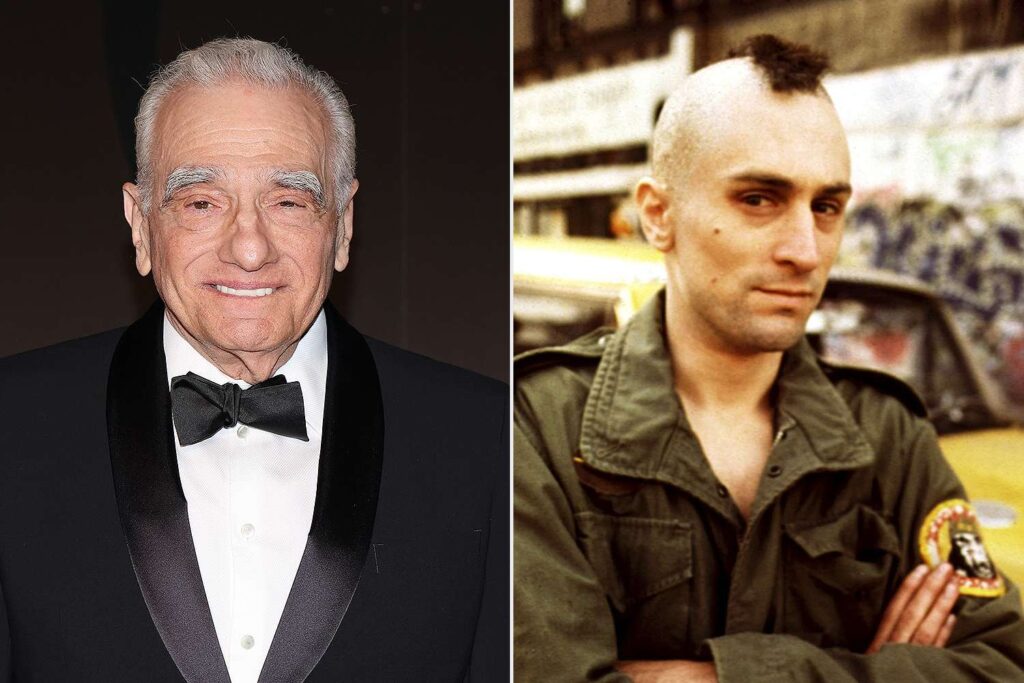NEED TO KNOW
Martin Scorsese’s controversial 1976 drama Taxi Driver was almost never released because of its extreme bloody content
The movie earned Oscar nominations for its stars Robert De Niro and Jodie Foster
The five-part documentary series Mr. Scorsese premieres Oct. 17 on Apple TV+
Nearly 40 years after its original release, Taxi Driver remains one of the most iconic films of the 1970s. But neither the making of the 1976 Martin Scorsese-directed masterpiece, which earned a Best Picture Oscar nomination and acting nods for Robert De Niro and Jodie Foster, nor the movie itself was a smooth trip.
As 82-year-old Scorsese and his pal Steven Spielberg recall in a first-look clip from the the upcoming five-part Apple TV+ documentary Mr. Scorsese, Columbia Pictures, squeamish about some of the bloody content of the movie, almost stopped Scorsese’s vision from riding into theaters.
Courtesy Everett Collection
“Marty was very upset,” Spielberg, 78, recalls at the beginning of the clip. “I get a call at the office, and he said (imitating Scorsese’s hyper New York City accent), ‘Steve, Steve, this is Marty. Can you come over to the house.’ ”
Then Scorsese himself explains, “They wanted me to cut all the blood spurting. They wanted me to cut the guy who loses the hand…”
“You got a gun?” an interviewer asks offscreen.
Scorsese responds: “I was going to get one.”
“So you said you were going to get a gun?” the interviewer asks.
Scorsese: “But I wasn’t going to get a gun. Really?”
Interviewer: “And you said you were going to do what with the gun?”
Apple TV
Scorsese: “I don’t know. I was angry. I said I was going to threaten them… I’ll maybe just shoot or something. I had no idea. I mean, I was just threatening. What I wanted to do, and not with a gun, I would go in, find out where the rough cut is, and break the windows and take it away. They were going to destroy the film anyway, you know. So let me destroy it. I’ll destroy it. But before destroying it, I’m going to steal it.”
“Spielberg said, ‘Marty, stop that. Marty you can’t do that.’ I said… The more they said no, the more I said I was going to do it,” he continues, breaking out laughing.
Ron Galella, Ltd./Ron Galella Collection via Getty
In the end, someone — “It may have been Marty,” Spielberg remembers — came up with an idea to “mollify” the MPAA [Motion Picture Association of America]. Scorsese toned down the bloodiness of the offending sequence and made it more grainy and tabloid-like. “He just had to take the color red down to a kind of brown,” Spielberg explains.
The result: an instant classic that further solidified the Mean Streets and Alice Doesn’t Live Here Anymore director’s standing as one of Hollywood’s most vibrant behind-the-scenes talents, and made Foster, who was just 12 years old when she filmed the movie, a star.
Scorsese would go on to receive 16 Oscar nominations (starting with 1980’s Raging Bull, also starring De Niro), including 10 for Best Director. He won Best Director for his 2006 Best Picture winner The Departed. This year, he’s up for the Outstanding Guest Actor in a Comedy Series Emmy for his appearance as himself on the Apple TV+ series The Studio.
Apple TV
Directed by Rebecca Miller, Mr. Scorsese, which will premiere globally on Oct. 17, “features exclusive, unrestricted access to Scorsese’s private archives, extensive conversations with the filmmaker himself and never-before-seen interviews with friends, family and creative collaborators,” according to Apple TV+.
In addition to Spielberg and Scorsese, the documentary series will include A-lister weigh-ins from De Niro (who has been in 10 Scorsese-directed films), Foster, Leonardo DiCaprio (star of six Scorsese-directed features), Casino Oscar nominee Sharon Stone, The Aviator Oscar winner Cate Blanchett and The Wolf of Wall Street breakout Margot Robbie, as well as musical collaborators Mick Jagger (Vinyl) and the late Robbie Robertson (The Last Waltz).
“This project is a filmmaker’s dream, to have had such access to legends of the industry, from Marty himself to his prolific collaborators, close friends and family members,” says Miller. “I was honored he trusted me to create this documentary, which I believe will resonate with everyone from dedicated Scorsese fans to anyone who has grappled with failure and reached for stars.”

